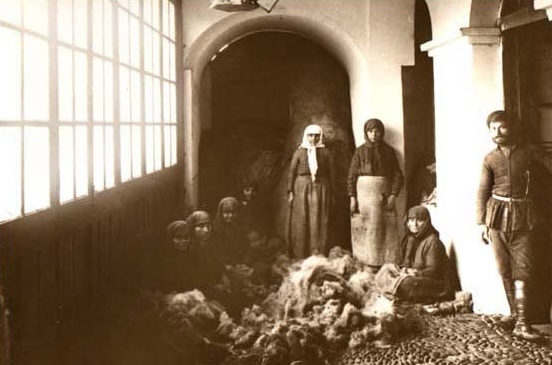In 1907 Stalin wrote a series of articles [1] on dialectical materialism and proletarian socialism, openly targeting an anarchist tendency that was achieving a foothold amid the local petty bourgeoisie in Tiflis, Georgia at the time. This note highlights a very useful short story found therein, about the practice and ideology of a shoemaker at Adelkhanov’s factory. Incidentally, Stalin’s father happend to be a shoemaker at Adelkhanov’s factory.
History shows that if at different times men were imbued with different ideas and desires, the reason for this is that at different times men fought nature in different ways to satisfy their needs and, accordingly, their economic relations assumed different forms.
There was a time when men fought nature collectively, on the basis of primitive communism; at that time their property was communist property and, therefore, at that time they drew scarcely any distinction between “mine” and “thine,” their consciousness was communistic. There came a time when the distinction between “mine” and “thine” penetrated the process of production; at that time property, too, assumed a private, individualist character and, therefore, the consciousness of men became imbued with the sense of private property. Then came the time, the present time, when production is again assuming a social character and, consequently, property, too, will soon assume a social character — and this is precisely why the consciousness of men is gradually becoming imbued with socialism.
Here is a simple illustration. Let us take a shoemaker who owned a tiny workshop, but who, unable to withstand the competition of the big manufacturers, closed his workshop and took a job, say, at Adelkhanov’s shoe factory in Tiflis. He went to work at Adelkhanov’s factory not with the view to becoming a permanent wage-worker, but with the object of saving up some money, of accumulating a little capital to enable him to reopen his workshop. As you see, the position of this shoemaker is already proletarian, but his consciousness is still non-proletarian, it is thoroughly petty-bourgeois. In other words, this shoemaker has already lost his petty-bourgeois position, it has gone, but his petty-bourgeois consciousness has not yet gone, it has lagged behind his actual position.
Clearly, here too, in social life, first the external conditions change, first the conditions of men change and then their consciousness changes accordingly.
But let us return to our shoemaker. As we already know, he intends to save up some money and then reopen his workshop. This proletarianized shoemaker goes on working, but finds that it is a very difficult matter to save money, because what he earns barely suffices to maintain an existence. Moreover, he realizes that the opening of a private workshop is after all not so alluring: the rent he will have to pay for the premises, the caprices of customers, shortage of money, the competition of the big manufacturers and similar worries — such are the many troubles that torment the private workshop owner. On the other hand, the proletarian is relatively freer from such cares; he is not troubled by customers, or by having to pay rent for premises. He goes to the factory every morning, calmly goes home in the evening, and as calmly pockets his pay on Saturdays. Here, for the first time, the wings of our shoemaker’s petty-bourgeois dreams are clipped; here for the first time proletarian strivings awaken in his soul.
Time passes and our shoemaker sees that he has not enough money to satisfy his most essential needs, that what he needs very badly is a rise in wages. At the same time, he hears his fellow-workers talking about unions and strikes. Here our shoemaker realizes that in order to improve his conditions he must fight the masters and not open a workshop of his own. He joins the union, enters the strike movement, and soon becomes imbued with socialist ideas… [2]
Thus, in the long run, the change in the shoemaker’s material conditions was followed by a change in his consciousness: first his material conditions changed, and then, after a time, his consciousness changed accordingly.
The same must be said about classes and about society as a whole.
In social life, too, first the external conditions change, first the material conditions change, and then the ideas of men, their habits, customs and their world outlook change accordingly.
That is why Marx says:
“It is not the consciousness of men that determines their being, but, on the contrary, their social being that determines their consciousness.” [3]
If we can call the material side — the external conditions being and other phenomena of the same kind — the content, then we can call the ideal side — consciousness and other phenomena of the same kind — the form. Hence arose the well-known materialist proposition: in the process of development content precedes form, form lags behind content.
[1] J.V. Stalin, Socialism or Anarchism? (1907). [web] — A. M.
[2] To be clear, according to Stalin himself, following Lenin, it is extremely important to travel that extra distance from Trade-Unionist consciousness towards actual Socialism: “It had to be proved that socialist consciousness is of great importance for the working-class movement, that without it the movement would be aimless Trade-Unionist wandering […]. Iskra appeared and magnificently accomplished this task. The book What Is To Be Done? appeared, in which Lenin emphasized the great importance of socialist consciousness. The Party ‘majority’ was formed and firmly took this path.” [web] — R. D.
[3] Karl Marx, A Contribution to the Critique of Political Economy, “Preface” (1859). [web] — A. M.
